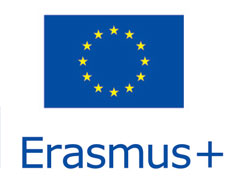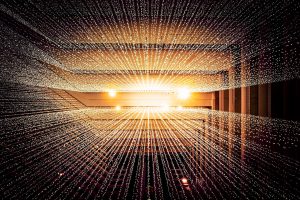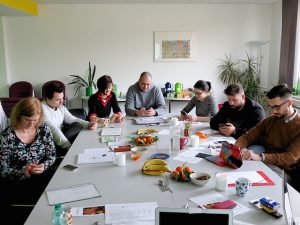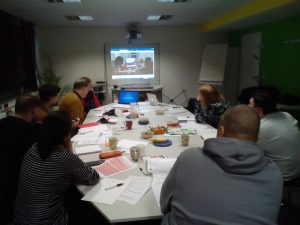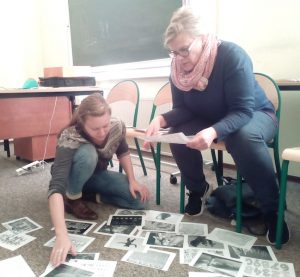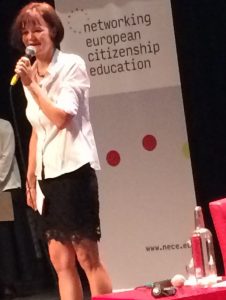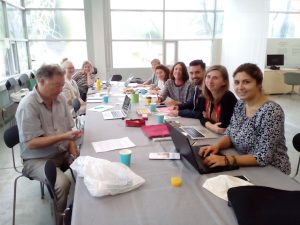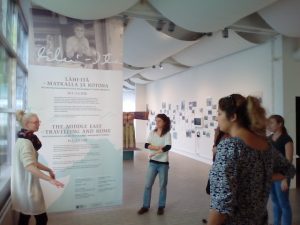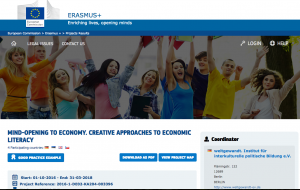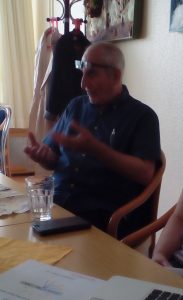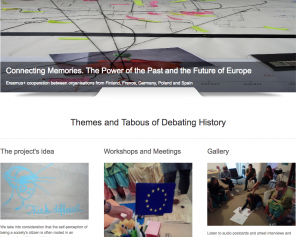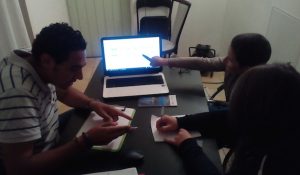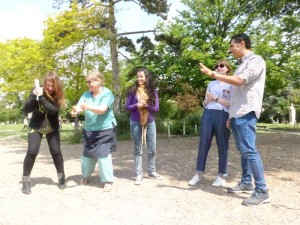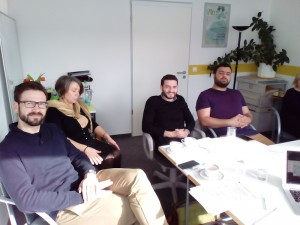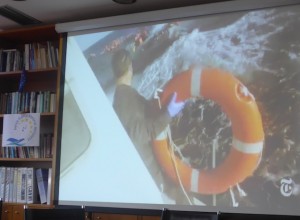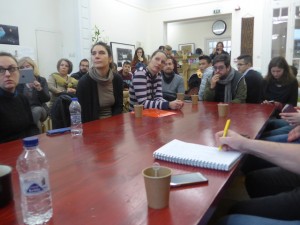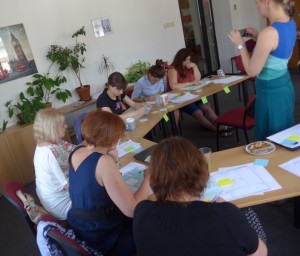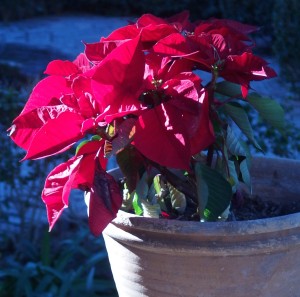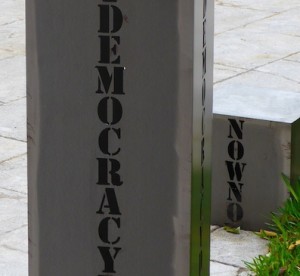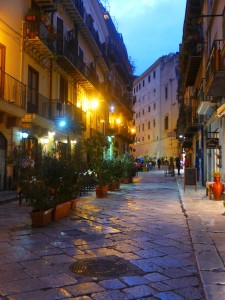Wiki with new address
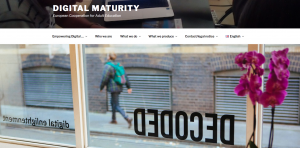 During the project on digital literacy, a wiki on technological, social and political aspects of digitalisation was created. It is now permanently available at this address. The project participants are looking forward to your comments! More information about the project can be found on the project website in five languages.
During the project on digital literacy, a wiki on technological, social and political aspects of digitalisation was created. It is now permanently available at this address. The project participants are looking forward to your comments! More information about the project can be found on the project website in five languages.
weltgewandt on Telegram
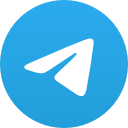 We now also use this channel to spread information about our own activities and inspirations from others. Our address is: https://t.me/weltgewandt. We are pleased about your interest – and subscribers.
We now also use this channel to spread information about our own activities and inspirations from others. Our address is: https://t.me/weltgewandt. We are pleased about your interest – and subscribers.
The art of giving feedback
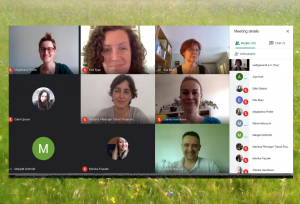 During the two-year cooperation “Fresh-up Economics” we create together a learning platform to enhance socio-economic education for adults in Europe. This is itself a learning process. It became clear during our last video conference on 06/08/2020. In a good sense. On the one hand, we discussed the contribution that was developed by the colleagues of the University of Vienna. The topic: “Climate and Economy“. On the other hand, the project partners gave their feedback on the contribution of the Estonian colleague on “Public Goods and Social Welfare“. The comments were differentiated and factual. Then the discussion turned to the question why we try to be multi-perspective. And what does that mean? Would we overburden the readers when different interpretations of individual topics – corresponding to the different schools of thought in economics – are mentioned? It turned out that the partners are at home in different cultures of thinking economics. This is what makes the cooperation so charming. It would be nicer, of course, if we could come together for a physical exchange and discuss some questions more intensively. But we’ll stay on, online.
During the two-year cooperation “Fresh-up Economics” we create together a learning platform to enhance socio-economic education for adults in Europe. This is itself a learning process. It became clear during our last video conference on 06/08/2020. In a good sense. On the one hand, we discussed the contribution that was developed by the colleagues of the University of Vienna. The topic: “Climate and Economy“. On the other hand, the project partners gave their feedback on the contribution of the Estonian colleague on “Public Goods and Social Welfare“. The comments were differentiated and factual. Then the discussion turned to the question why we try to be multi-perspective. And what does that mean? Would we overburden the readers when different interpretations of individual topics – corresponding to the different schools of thought in economics – are mentioned? It turned out that the partners are at home in different cultures of thinking economics. This is what makes the cooperation so charming. It would be nicer, of course, if we could come together for a physical exchange and discuss some questions more intensively. But we’ll stay on, online.
Fresh-up Economics: website online
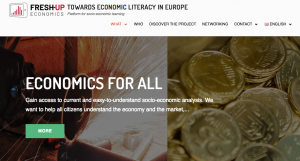 weltgewandt e.V. coordinates a two-year project with organisations in six EU countries on socio-economic education. The consortium aims to provide inspirations for a better understanding of economy and economics. A six-language learning platform is currently being developed for this purpose. For selected topics, it will contain short versions in easy language for all citizens. The detailed version is intended for adult educators and interested people who would like to obtain detailed information. The didactic parts may encourage trainers and teachers to include socio-economic questions in their educational work. Due to the current corona crisis the publication of the first parts of the learning platform had to be postponed. The reason for this is that the partners would first like to test the methodological parts together and revise them if necessary. Until then we will publish short articles on individual topics. The website is now online. More information about the learning platform can be found on this page.
weltgewandt e.V. coordinates a two-year project with organisations in six EU countries on socio-economic education. The consortium aims to provide inspirations for a better understanding of economy and economics. A six-language learning platform is currently being developed for this purpose. For selected topics, it will contain short versions in easy language for all citizens. The detailed version is intended for adult educators and interested people who would like to obtain detailed information. The didactic parts may encourage trainers and teachers to include socio-economic questions in their educational work. Due to the current corona crisis the publication of the first parts of the learning platform had to be postponed. The reason for this is that the partners would first like to test the methodological parts together and revise them if necessary. Until then we will publish short articles on individual topics. The website is now online. More information about the learning platform can be found on this page.
Website webinar
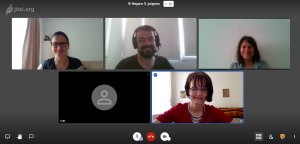 “I feel more literate to create a website.”
“I feel more literate to create a website.”
“A very, very nice description of the necessary steps.”
“I got a global image on wordpress websites, pages, posts, plugins, menus.”
“A good example of distance learning.”
Four feedbacks on the internal webinar about building one’s own website with participants from Focsani/Romania, Málaga and Berlin on 21st July 2020. The idea of sharing this knowledge came during the project Empowering Digital Literacy and results from a raising interest in the world of digitalisation and the wish of being not only a consumer but also a producer of content. The three-hours interactive webinar encompassed basics like developing a website’s concept in the beginning (idea, aims, target groups, main messages, etc.), writing draft texts, respecting authors and photographers rights, and others. In the practical part were shown the world of designs/themes, how to create a page and a post, how to translate them, and what should be taken into consideration when arranging the menus. Some plugins were presented. A separate part was dedicated to the page builder elementor. The main aim was to stimulate motivation and to leave only a small place for the fear…
… to do it oneself.
Research on people’s competencies 45+
 Within the framework of our project Upskilling 45+ we are currently conducting interviews with migrants and refugees as well as with people who work with them. We are interested in what adults of this age and with a history of migration are able to do and have learned, what their needs and requirements and what their digital skills are. We are pleased about the great willingness to participate in the survey. One thing is clear from all the interviews: language skills are crucial to everything. This applies equally to Roma, people with German background from Russia/Soviet Union, refugees from Syria, Afghanistan and Iraq. Moreover, Self-organisation promotes integration, and there are good examples of this in Berlin, see the Polish Social Council. Integration is also political, because a new balance is needed between the long-term citizens and the newcomers – without playing one off against the other. The survey results of the five countries will be published in the coming months.
Within the framework of our project Upskilling 45+ we are currently conducting interviews with migrants and refugees as well as with people who work with them. We are interested in what adults of this age and with a history of migration are able to do and have learned, what their needs and requirements and what their digital skills are. We are pleased about the great willingness to participate in the survey. One thing is clear from all the interviews: language skills are crucial to everything. This applies equally to Roma, people with German background from Russia/Soviet Union, refugees from Syria, Afghanistan and Iraq. Moreover, Self-organisation promotes integration, and there are good examples of this in Berlin, see the Polish Social Council. Integration is also political, because a new balance is needed between the long-term citizens and the newcomers – without playing one off against the other. The survey results of the five countries will be published in the coming months.
Photo by Johan Mouchet on Unsplash, montage SB/weltgewandt e.V.
Moving on, but not moving
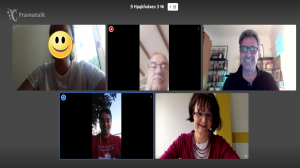 European cooperation projects for adult education aim at sharing methods, creating a result together and to learn from each other, among other things by getting to know the working contexts of the partner organisations. At short management meetings or joint, longer workshops. Normally. But times are just not normal. So there was another online meeting within the Climate + Change project on 9th July 2020. The colleagues discussed possibilities to put all planned activities of the two-year project in practice and to bridge the time when all are in its ‘home zone’ and cannot travel. At the moment everyone is working on their contributions to the online course (MOOC) on climate change and is looking forward to testing its didactic parts together. In Athens, end of September. Hopefully.
European cooperation projects for adult education aim at sharing methods, creating a result together and to learn from each other, among other things by getting to know the working contexts of the partner organisations. At short management meetings or joint, longer workshops. Normally. But times are just not normal. So there was another online meeting within the Climate + Change project on 9th July 2020. The colleagues discussed possibilities to put all planned activities of the two-year project in practice and to bridge the time when all are in its ‘home zone’ and cannot travel. At the moment everyone is working on their contributions to the online course (MOOC) on climate change and is looking forward to testing its didactic parts together. In Athens, end of September. Hopefully.
Digital Literacy goes digital
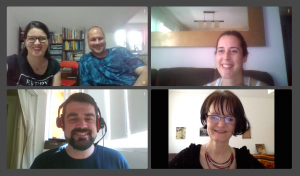 Framatalk/Jitsi meet, GotoMeeting, ClickMeeting, zoom, Skype, Blizz, Adobe Connect, Nextcloud: One video conference follows the other. Four team members from weltgewandt ‘welcomed’ colleagues from Romania and Spain – instead of the planned real meeting. One of the topics was our Wiki. The “Erasmus+ spirit” of cooperation and sharing of information and knowledge was once again fully felt. 🙂
Framatalk/Jitsi meet, GotoMeeting, ClickMeeting, zoom, Skype, Blizz, Adobe Connect, Nextcloud: One video conference follows the other. Four team members from weltgewandt ‘welcomed’ colleagues from Romania and Spain – instead of the planned real meeting. One of the topics was our Wiki. The “Erasmus+ spirit” of cooperation and sharing of information and knowledge was once again fully felt. 🙂
Wiki on Digital Literacy
We are experiencing a world in transformation. This includes digitalisation. The corona pandemic is increasing the use of digital means for communication and business. This is not only a technological change, it also affects the individual’s behaviour, the ways of living together, society and politics. To understand the new, to meet it confidently, to develop digital maturity is a learning task for everyone. Hence this Wiki.
Who is this platform for?
Adult educators and European citizens with an interest in society, politics and the future.
What do we offer?
We understand digitalisation as a process that presupposes and promotes technological change, brings change for the whole society and is politically framed. Digital literacy does not mean adapting to technological change in the best possible way only. Acquiring technological knowledge and skills goes along with developing an awareness of the various dimensions of digitalisation and to ask how it can be shaped so that digitalisation serves the well-being of all. To this end, we offer various considerations. Moreover, the contributions contain descriptions of formal and non-formal training methods. They were tested in joint workshops to be applied in adult education.
Who informs?
The authors are adult educators from Germany, France, Romania and Spain. The idea of this cooperation is combining our different competences as IT teachers, engineers, psychologists and social scientists and work with both formal and non-formal methods for adult education.
Enjoy reading. Write comments. Get in touch with us.
Find further information on the project’s website.
H E R E Y O U G O …
Photo by Joshua Sortino on unsplash.com
Climate + Change: Website online
 weltgewandt e.V. coordinates a two-years cooperation of organisations from four countries of the European Union referring to climate change. Please find inspirations on the project’s website concerning the issue, the project and the participating partners. The project’s activities will be documented and the results – among others an online course – step-by-step published. Enjoy reading!
weltgewandt e.V. coordinates a two-years cooperation of organisations from four countries of the European Union referring to climate change. Please find inspirations on the project’s website concerning the issue, the project and the participating partners. The project’s activities will be documented and the results – among others an online course – step-by-step published. Enjoy reading!
Digital Literacy: Workshop in Málaga, 18/02-23/02/2020
 Participants in the European cooperation on technological, social and political aspects of digitalisation met each other in southern Spain for an intensive seminar. This time, the focus was on practical applications: the partners learned about digital tools for cooperative work, how to use a wiki for both content creation and joint exchange, they tested online templates for CVs and applications and practised programming – very easily, with Lego bricks. All these methods can be passed on in the specific context of each partner organisation. And beyond that.
Participants in the European cooperation on technological, social and political aspects of digitalisation met each other in southern Spain for an intensive seminar. This time, the focus was on practical applications: the partners learned about digital tools for cooperative work, how to use a wiki for both content creation and joint exchange, they tested online templates for CVs and applications and practised programming – very easily, with Lego bricks. All these methods can be passed on in the specific context of each partner organisation. And beyond that.
Change the Climate Change
Kick-off meeting in Sofia/Bulgaria, 17-19/01/2020
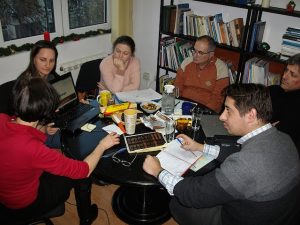 Climate change became a ‘hot’ topic: weltgewandt cooperates with organisations in Bulgaria, Greece and Italy on various aspects of this issue. During the kick-off meeting of the 2-years project in Sofia got the colleagues impressions from the educational activities of the Bulgarian partner organisation HESED and its main target group, Roma citizens. Moreover, the whole project was planned in detail including the online course which we are going to create. A fruitful “starter”!
Climate change became a ‘hot’ topic: weltgewandt cooperates with organisations in Bulgaria, Greece and Italy on various aspects of this issue. During the kick-off meeting of the 2-years project in Sofia got the colleagues impressions from the educational activities of the Bulgarian partner organisation HESED and its main target group, Roma citizens. Moreover, the whole project was planned in detail including the online course which we are going to create. A fruitful “starter”!
Civic Education goes Europe
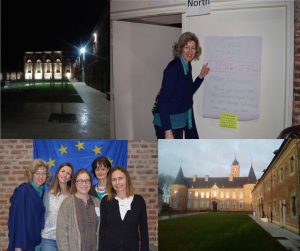 52 adult educators from 19 countries of the European Union and Turkey came together near Bilzen in Belgium from 27th to 30th November 2019 to discuss active citizenship and civic/political education, to build project groups and to develop joint projects. Constructive, productive, stimulating. Great experience! Funded by the Erasmus+ programme for Adult Education.
52 adult educators from 19 countries of the European Union and Turkey came together near Bilzen in Belgium from 27th to 30th November 2019 to discuss active citizenship and civic/political education, to build project groups and to develop joint projects. Constructive, productive, stimulating. Great experience! Funded by the Erasmus+ programme for Adult Education.
NO GENDER GAP: Project meeting in Amsterdam, 14/11-16/11/2019
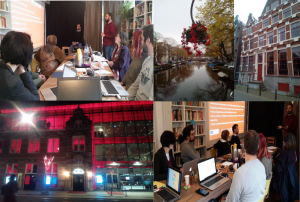 What is a robot? What does robotics mean? Do humanoid robots have a gender? Which women gained influence in the history of robotics? How can we encourage women today to engage in technology? Which everyday objects are suitable for trying to program a technical supportive device (robot) yourself? The remote control of a thermostat or the control of a hair dryer’s temperature? The colleagues from the partner organisations involved in the project NO GENDER GAP exchanged on these and other questions and planned the next steps for the coming months. The focus is on the development of a MOOC and a methodological guide on women and technology.
What is a robot? What does robotics mean? Do humanoid robots have a gender? Which women gained influence in the history of robotics? How can we encourage women today to engage in technology? Which everyday objects are suitable for trying to program a technical supportive device (robot) yourself? The remote control of a thermostat or the control of a hair dryer’s temperature? The colleagues from the partner organisations involved in the project NO GENDER GAP exchanged on these and other questions and planned the next steps for the coming months. The focus is on the development of a MOOC and a methodological guide on women and technology.
Fresh-up Economics: Kick-off meeting in Prague
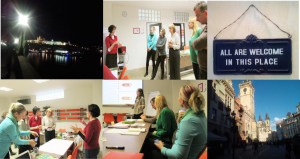 Within the framework of the Erasmus+ project “Fresh-up Economics. Towards Economic Literacy in Europe” invited the Czech partner organisation Aviteum colleagues from Vienna / Austria, Tartu / Estonia, Dublin / Ireland, Lublin / Poland, Barcelona /Spain and Berlin to the first project meeting in Prague from 7th to 9th November 2019. We jointly planned the design and content of the learning platform for adult socio-economic education to be developed. In particular, we once again dealt intensively with the target group and the needs of future users. We discussed the fine-tuning of the economic topics to be dealt with: market and state, labour, money, taxes, debt, migration and global justice. Now we are eagerly awaiting the first texts of the other partner organisations to discuss them together at the next meeting.
Within the framework of the Erasmus+ project “Fresh-up Economics. Towards Economic Literacy in Europe” invited the Czech partner organisation Aviteum colleagues from Vienna / Austria, Tartu / Estonia, Dublin / Ireland, Lublin / Poland, Barcelona /Spain and Berlin to the first project meeting in Prague from 7th to 9th November 2019. We jointly planned the design and content of the learning platform for adult socio-economic education to be developed. In particular, we once again dealt intensively with the target group and the needs of future users. We discussed the fine-tuning of the economic topics to be dealt with: market and state, labour, money, taxes, debt, migration and global justice. Now we are eagerly awaiting the first texts of the other partner organisations to discuss them together at the next meeting.
Steps towards Digital Maturity
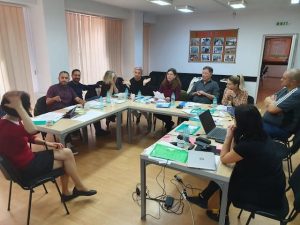 History of DIGITALISATION, Artificial Intelligence, Cyberbullying, Big data: weltgewandt e.V. coordinates project “Empowering Digital Literacy in a Transforming World” funded by the Erasmus+ programme of the European Union. Colleagues from organisations in Málaga, Paris and Berlin were hosted by the Romanian partner in Focsani/Romania from 18th to 23rd October. They exchanged on these issues and experienced methods to make digitalisation a subject of adult learning. Moreover, the group discussed contributions to be provided on the project’s wiki (still not published). More about the project on its website.
History of DIGITALISATION, Artificial Intelligence, Cyberbullying, Big data: weltgewandt e.V. coordinates project “Empowering Digital Literacy in a Transforming World” funded by the Erasmus+ programme of the European Union. Colleagues from organisations in Málaga, Paris and Berlin were hosted by the Romanian partner in Focsani/Romania from 18th to 23rd October. They exchanged on these issues and experienced methods to make digitalisation a subject of adult learning. Moreover, the group discussed contributions to be provided on the project’s wiki (still not published). More about the project on its website.
There is No Revolution to Make without Women
HERstory and Dynamics of the Democratic Change of 1989 in the GDR
 During the European cooperation on perceptions of history, we have developed educational materials on women and the democratic upheavals of 1989. The women were often the ones who gave impulses, inspired and had the courage to start. In addition, there were associations such as the „Lila Offensive“ (Purpur Offensive) and the Independent Women’s Federation, which claimed for political feminist concerns. In Part I, the treatise on the topic, this is explained using examples. The appreciation of individual women and women’s groups is embedded in a presentation of the events that took place BEFORE the opening of the Wall on 9th November 1989. The description leads to a critique of current memory politics, in particular the narrative of a linear development of oppositional activities during the GDR, the „Aufbruch ’89“ (breakup ’89) and the German unification on 3rd October 1990. Instead, it pleads for the ideas of the citizens‘ movements – including those of women – from the period of the democratic upheaval for „peace, justice and the preservation of creation“ to be updated in view of current crises. Part II and Part III contain (suggestions to) exercises for educational work with adults on sensitive historical issues. They were commonly tested together during two 5-day workshops. More on the multilingual project’s website.
During the European cooperation on perceptions of history, we have developed educational materials on women and the democratic upheavals of 1989. The women were often the ones who gave impulses, inspired and had the courage to start. In addition, there were associations such as the „Lila Offensive“ (Purpur Offensive) and the Independent Women’s Federation, which claimed for political feminist concerns. In Part I, the treatise on the topic, this is explained using examples. The appreciation of individual women and women’s groups is embedded in a presentation of the events that took place BEFORE the opening of the Wall on 9th November 1989. The description leads to a critique of current memory politics, in particular the narrative of a linear development of oppositional activities during the GDR, the „Aufbruch ’89“ (breakup ’89) and the German unification on 3rd October 1990. Instead, it pleads for the ideas of the citizens‘ movements – including those of women – from the period of the democratic upheaval for „peace, justice and the preservation of creation“ to be updated in view of current crises. Part II and Part III contain (suggestions to) exercises for educational work with adults on sensitive historical issues. They were commonly tested together during two 5-day workshops. More on the multilingual project’s website.
Project meeting on Digital Literacy in Paris
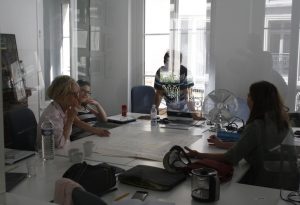 weltgewandt e.V. coordinates the Erasmus+ cooperation on Empowering Digital Literacy in a Transforming World with partner organisations in France, Romania and Spain. We came together for a transnational project meeting in Paris from 3rd to 5th July 2019. It was dedicated to project management, training sessions about wiki designing and an exchange on the wiki contents we are going to create during the project. All participants (2 per organisation) were impressed by the user centered design method in which Renaud Bessiers from qodop introduced. We then discussed on how to apply this approach in our context of European adult education. We agreed on the next steps of the Wiki’s content production. Moreover, we discussed the programme of the following workshop in Romania in October 2019 when we combine discussing articles of the wiki with sharing methods for an “analog” learning on technical, social and political aspects of the digitalisation. We experienced two rich days of collaborative work which also gave insights in the profile and organisation culture of our French partner COOPETIC.
weltgewandt e.V. coordinates the Erasmus+ cooperation on Empowering Digital Literacy in a Transforming World with partner organisations in France, Romania and Spain. We came together for a transnational project meeting in Paris from 3rd to 5th July 2019. It was dedicated to project management, training sessions about wiki designing and an exchange on the wiki contents we are going to create during the project. All participants (2 per organisation) were impressed by the user centered design method in which Renaud Bessiers from qodop introduced. We then discussed on how to apply this approach in our context of European adult education. We agreed on the next steps of the Wiki’s content production. Moreover, we discussed the programme of the following workshop in Romania in October 2019 when we combine discussing articles of the wiki with sharing methods for an “analog” learning on technical, social and political aspects of the digitalisation. We experienced two rich days of collaborative work which also gave insights in the profile and organisation culture of our French partner COOPETIC.
European perspectives on „1989“
 Colleagues from the cooperation Connecting Memories. The Power of the Past and the Future of Europe came together in Málaga/Spain from 24th to 26th April 2019 and exchanged on the draft teaching material regarding the democratic change in GDR and Eastern Europe in 1989. The focus lays on the wide range of activities (demonstrations, public meetings, emigration movement) which took place from spring 1989 on and which have been enabled the wall opening on 9th November 1989. Those who criticised the regime by claiming for democracy, human rights and freedom (to travel) were encouraged by the Solidarnosc movement in Poland and the Charta 77 group in Czechoslovakia. A special focus is given to the women who often stimulated the developments.
Colleagues from the cooperation Connecting Memories. The Power of the Past and the Future of Europe came together in Málaga/Spain from 24th to 26th April 2019 and exchanged on the draft teaching material regarding the democratic change in GDR and Eastern Europe in 1989. The focus lays on the wide range of activities (demonstrations, public meetings, emigration movement) which took place from spring 1989 on and which have been enabled the wall opening on 9th November 1989. Those who criticised the regime by claiming for democracy, human rights and freedom (to travel) were encouraged by the Solidarnosc movement in Poland and the Charta 77 group in Czechoslovakia. A special focus is given to the women who often stimulated the developments.
Connecting Memories. Visual impressions from a workshop in Lódz
The AHE university in Lódz/PL hosted the second workshop of our project Connecting Memories. The Power of the Past and the Future of Europe in November 2018. Adult educators from each partner organisation in Finland, France, Poland, Spain and Berlin shared creative methods to gain learner’s interest in history of the own and of other European societies. We got to know HERstory and learned about the multicultural past of Lódz. And we applied hand mapping, “thinking hats”, etc. Encouraging, inspiring, enriching. The 3 minutes video is ready now.
NO GENDER GAP: project meeting in Genua
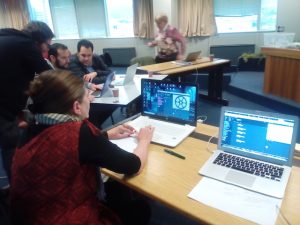 Colleagues from Italy, Spain, the Netherlands, Portugal, France and Berlin came together from 3rd to 5th April 2019 and worked on the further development of a MOOC and a methodological guide. We want open women’s mind to creative programming and robotics and enable them taking actively part in this field of labour, society and politics. A promising project with a team of engaged and competent educators. “We have so much in common.” This is the feedback of one attendee who has gained his first experiences in the European educational cooperation.
Colleagues from Italy, Spain, the Netherlands, Portugal, France and Berlin came together from 3rd to 5th April 2019 and worked on the further development of a MOOC and a methodological guide. We want open women’s mind to creative programming and robotics and enable them taking actively part in this field of labour, society and politics. A promising project with a team of engaged and competent educators. “We have so much in common.” This is the feedback of one attendee who has gained his first experiences in the European educational cooperation.
Digitalisation, the new magic formula?
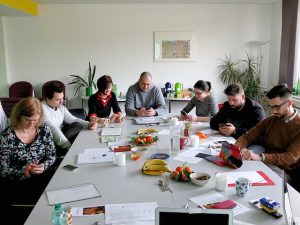 Colleagues from partner organisations in France, Romania, Spain and Germany met each other in Berlin from 29th to 31st January 2019 for a working meeting as part of the project “Empowering Digital Literacy in a Transforming World“. The focus was on planning the next steps of our exchange of good practices and the joint development of a wiki on technological, social and political issues of digitisation in Europe.
Colleagues from partner organisations in France, Romania, Spain and Germany met each other in Berlin from 29th to 31st January 2019 for a working meeting as part of the project “Empowering Digital Literacy in a Transforming World“. The focus was on planning the next steps of our exchange of good practices and the joint development of a wiki on technological, social and political issues of digitisation in Europe.
Picture: Paradoxies of communication in times of digitisation…
New Year’s Reception
Meanwhile we cooperate with colleagues in Estonia, Finland, France, Greece, Italy, Poland, Portugal, Romania, Slovenia, Spain and Turkey. During the well attended New Year’s Reception on 7th February 2019, we presented our projects and what we have learned during our European projects. For example, we invited to take part in a climate buffet. We practiced the methods of Thinking Hats afterwards when we discussed the (possibly) “abolishment of cash in 2022”. Participants were invited to take a hat and contribute their ideas according to its colour and the perspective which does it imply. Blue meant the focus on information and facts, red the feelings which s.o. has in terms of the theme, green positive aspects, white criticism and dangers, yellow solutions. This way of exchange allowed a profound and rich debate. An inspiring experience!
The Magic of Digitalisation…
Colleagues form partner organisations in France, Germany, Romania, and Spain came in Berlin together from 29th to 31st January 2019. They collaborate within the Erasmus+ project Empowering Digital Literacy in a Transforming World. The main focus of the meeting was given on the common production of a Wiki referring to technological, sociological and political aspects of digitisation in Europe.
Empowering Digital Literacy in a Transforming World
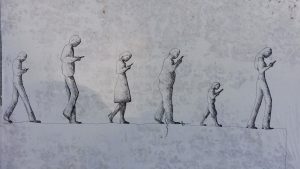 Our project’s website is online now. Step by step we will enrich its content…
Our project’s website is online now. Step by step we will enrich its content…
Climate Change
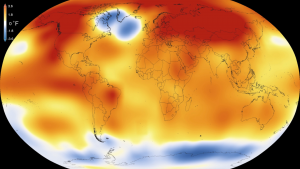 The changing temperatures, extreme events, ocean acidification, declining arctic sea ice and many more phenomenons give significance of the current global warming trend. Is it the result of human activity? Most of the researchers say: definetely, yes! For an overview see the arguments given by the NASA. In which way is this linked to economy? Among many other reasons, the energy supply of the 19th and 20th century was mostly based on the burning fossil fuels.
The changing temperatures, extreme events, ocean acidification, declining arctic sea ice and many more phenomenons give significance of the current global warming trend. Is it the result of human activity? Most of the researchers say: definetely, yes! For an overview see the arguments given by the NASA. In which way is this linked to economy? Among many other reasons, the energy supply of the 19th and 20th century was mostly based on the burning fossil fuels.
Picture: NASA Scientific Visualization Studio – https://svs.gsfc.nasa.gov / Goddard Space Flight Center – https://www.nasa.gov/centers/goddard – http://www.nasa.gov/sites/default/files/thumbnails/image/16-008.jpeg, Public Domain, https://commons.wikimedia.org/w/index.php?curid=46523508
History provokes – today
Body/hand mapping, telling stories about an object, putting on different “glasses” on a theme, games and exercises from theatre work: During the 4-days workshop from 5-8 November 2018 in Lódz/Poland, actors from organisations in five European countries passed on their methods of education on historical topics to their colleagues. It was more than just joint experimentation, the themes such as the coexistence of Christians, Muslims and Jews in Andalusia, the Spanish Civil War 1936-38, the rich but also painful history of Lódz and other topics opened new horizons and were sometimes very touching.
NO GENDER GAP in Times of Digitalisation
weltgewandt is the partner organisation of a European cooperation to promote the digital skills of women. The kick-off meeting of the coordinators took place from 29-31 October 2018 in Madrid. The face-to-face encounter enabled a productive exchange and opened further horizons of the project topic. More details about the 2-year collaboration are given in the project presentation.
European Conference on Civic and Citizenship Education in Marseille
The project head of weltgewandt. Institute for Intercultural Civic Education observed this year’s conference on Networking European Citizenship Education in Marseille. The subject was “Brave New Worlds?! The Future of Democracy and Citizenship Education”. Unfortunately, the conference was very weak regarding the analysis of social and political developments, and controversies were avoided. Self-reflection as educational actors in difficult times was also missing. This is not how the future of socio-political education should be. Fortunately, the three days offered didactical inspirations, allowed insights in funding opportunities and gave plenty of opportunity to get in touch with other educational actors in Europe and North Africa.
The Future of History
Meeting within the framework of the Connecting Memories project in Helsinki from 29th-31st August 2018 with partners from Finland, France, Poland, Spain and Berlin. We moved on working on our project’s results and exchanged on themes and taboos of public remembrance, e.g. the Franco dictatorship, the ‘wound’ of the German unification process and its socio-economic impacts, colonialism and migration in France and the Polish transformation during the 1990s. We asked : What is said in public, what neglected ? Do we talk about future if we take history into consideration ? A very fruitful, vibrant exchange at an inspiring place, the Helinä Rautavaaran Museum.
Example of Good Practise
Our project Mind-opening to Economy. Creative Approaches to Economic Literacy has been chosen as an Example of Good Practice. Our work makes sense. We are happy. 🙂 See the Erasmus+ projects results platform.
Update folder weltgewandt e.V.
Connecting Memories: Local event, 2nd July
The 3 ‘weltgewandt’ participants in the 5-days workshop in Marseille in May 2018 shared in a local event with colleagues and adult learners from Berlin how the European exchange helped enlarging their methodological skills. We discussed to adapt producing audio postcards in our city and in particular in Marzahn. Such a sound collection could include the almost regular S-Bahn voice “Dieser Zug entfällt heute.” (“This train is cancelled today.”) but also the melody of singing birds, the diction of Russian speaking ladies in a shopping mall or the symphony (cacophony?) of a public debate on democracy in Berlin. Let’s try it! See more on our project’s site.
History under Discussion
The project site of the European cooperation CONNECTING MEMORIES. The Power of the Past and the Future of Europe (Erasmus+) is online now. It will be updated with more contents during the whole project.
FUTURE 4.0: The Digitization of Economy and Society
During the ECOLIT project, partners developed teaching material on the subject of digitization. It contains an introduction to the history of industry 1.0-4.0, technological aspects (like artificial intelligence and algorithm, robotics, 3D printing), impacts on society, the political framing of the developments and the role of education. Moreover, the material provides exercises and games for trainers in adult education. More information on the European cooperation and the methods which partners exchanged are provided on the project’s website.
Connecting Memories: making history a lively experience
„I really got out of the comfort zone. It was comfortable.“ This was the feedback of one Finish participant referring to our learning and teaching activities in Marseille from 8th to 12th May 2018. Team members from weltgewandt e.V. met colleagues from organisations in Finland, Spain, Poland and France in Marseille exchanging on methods of historical-political education. The focus layed on different topics such as stories of migration, the German unification process 1989-1995 and propaganda during German fascism. We played free theatre and learned on how to make a documentary. Serious themes may be a subject of joy AND deeper reflection.
weltgewandt.polis on Facebook and Instagram
![]()
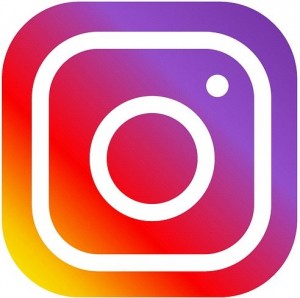 You may get information on our activities also on Facebook and Instagram. Feel free to “like” us.
You may get information on our activities also on Facebook and Instagram. Feel free to “like” us.
Artificial Intelligence and Robots: Paradise Conditions at the Price of Submission?
During our project on Economic Literacy we also focus on the digitalisation of economy, often called „industry 4.0“ or „work 4.0“. Our public discussion event with colleagues from the partner’s countries on 16th February 2018 helped structuring a broad and complex theme. We discussed chances and challenges and the need of democracy to combine new opportunities with growing welfare for all. An inspiring exchange!
Economic Literacy live
Representatives of weltgewandt e.V. and the partner organisations in the Czech Republic, Estonia and the UK met each other in Berlin from 15th to 17th February 2018 and continued working on the project results. We create teaching material on digitisation in the workplace / work 4.0. Soon online!
Connecting Memories. The Power of the Past and the Future of Europe
Kick-off meeting in Berlin, 01/02-02/02/2018
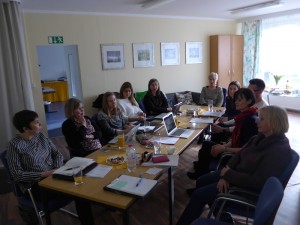 weltgewandt. coordinates a European cooperation (Erasmus+) with partner organisations in Finland, France, Poland and Spain. We focus on the culture of remembrance and the politics of history in each partner’s country. The self-perception as a society’s citizen is often rooted in an interpretation of history, either consciously or unconsciously. Exchanging on different historical topics helps understanding ‚the other‘ and the debating culture in partner’s countries. That’s the aim of the project. Moreover, as adult educators we intend to inspire each other implementing new methods to reach so-called disadvantaged learners in historical-political education. We discuss issues beyond the nation state’s horizon and ask for a democratic future of Europe.
weltgewandt. coordinates a European cooperation (Erasmus+) with partner organisations in Finland, France, Poland and Spain. We focus on the culture of remembrance and the politics of history in each partner’s country. The self-perception as a society’s citizen is often rooted in an interpretation of history, either consciously or unconsciously. Exchanging on different historical topics helps understanding ‚the other‘ and the debating culture in partner’s countries. That’s the aim of the project. Moreover, as adult educators we intend to inspire each other implementing new methods to reach so-called disadvantaged learners in historical-political education. We discuss issues beyond the nation state’s horizon and ask for a democratic future of Europe.
The first meeting was dedicated to the project’s planning. However, we also took time to discuss aspects of the public remembering of the Franco dictatorship in Spain and the current conflict in/of Catalonia. An enriching, encouraging experience!
Voluntary and Support Activities for Refugees in Greece
„Our main aim is to keep the humanity.“ This says the script writer and art director of the TOPOS ALLOU theatre in Athens, Nikos Kamtsis-Ekinotetis, in terms of challenges caused by the migration influx in 2015 and afterwards. Within the project Safer Places Hopeful Refugees (Erasmus+) could three participants from weltgewandt e.V. talk to him and to members of other organisations, e.g. the Melissa Women Immigrants‘ Network. Amazing, what educators/culture and social workers may achieve if they develop clever ideas, create sustainable networks in the neighborhood and beyond, and follow a strong will for change.
Happy Year 2018
The weltgewandt („open to the world“) Intercultural Political Education Institute wishes you a Merry Christmas and a Happy New Year for 2018 ! May the festive season bring you peace and joy. May you find the special light which dignifies all people and gives them the strength to change.
For 2018 we wish you inspiration, success and the necessary pinch of humor.
We are looking forward to cooperating with you!
– – –
L’institut pour une éducation politique et interculturelle weltgewandt(„ouvert sur le monde“) vous souhaite un Joyeux Noël et un bon passage à 2018. Que les fêtes et le temps passé entre vous apportent paix et détente et qu’ils vous fassent ressentir cette lumière particulière qui apporte la dignité à tous et la force du changement.
Nous vous souhaitons pour 2018 de l’inspiration, du succès et un zeste nécessaire d’humour.
Nous serons heureux d’avoir l’occasion de vous convier aux prochains événements organisés par weltgewandt.
– – –
السيدات والسادة المحترمون، أصدقائنا الأعزاء، لكم منا أطيب التحيات:
تتمنى لكم „weltgewandt.“ أعياد ميلاد مجيدة وأسعد الأوقات كما تتمنى ايضا أن يكون عبوركم إلى العام الجديد عبورا مثمرا.
نرجو أن تحل علينا الأعياد المجيدة لهذا العام بالطمأنينة والسلام، فتشعرنا إذا بذلك الضوء الخاص الذي يمنح كل الناس مكانة وكرامة ويعطيهم القوة للتغيير.
نتمنى لكم لعام 2018 الإلهام والنجاح ونفحة من المرح.
إنه ليسعدنا ويشرفنا وجودكم معنا في المناسبات المختلفة التي تقيمها weltgewandt.
Economic Literacy – Training in Tartu/Estonia
Six participants from weltgewandt e.V. took part in a training about environmental economics and management skills for life from 7th to 11th November 2017. What’s the difference between private and public goods? What about the tragedy of the commons? And basicly, what is a market? Is is it a social construction? We enjoyed a fruitful time both in a healthy nature and at Tartu university.
Our Czech partner, EDUcentrum, created some video impressions, Kairos Europe from the UK published a short interview video.
Supporting Newcomers in Sweden
„Everything is so reasonable here.“ That’s the meaning of one of the staff member from weltgewandt e.V. who attended the transnational training in Sweden from 28/08 to 02/09/2017. It was hosted by our partner organisation IFALL – Integration för Alle and took place within the framework of our Erasmus+ project Safer Places Hopeful Refugees. Our exchanges focused on supporting newcomers to get involved in their new society and on how to build bridges to local citizens. Equality, both social equality and equality of chances is a strong value in our Northern neighbor country. And this has a positive economic impact: If the state and municipalities support the integration process actively, newcomers find easier a job, pay taxes, buy property and ‚pushes‘ therefore the economy. Social tensions can be avoided. Reasonable!
Newsletter Safer Places Hopeful Refugee project
Our Italien partner created the first newsletter of our project funded by the European Union’s Erasmus+ programme for Adult Education. See also as pdf file: Newsletter-SPHR.pdf.
Political Education with Newcomers, what’s this?
This was the theme of the 5-days workshop (13th to 17 June 2017) for trainers and teachers from Turkey, Greece, Italy, Austria and Sweden as part of our project Safer Places Hopeful Refugees (Erasmus +). We debated concepts of citizenship education and community learning. In exchange with newcomers from Syria, we learned how they perceive their new surroundings, what they like, what is missing, what their orientations are and what they want. When we visited the refugee’s residence managed by Hero Norge at Wittenberger Str. 16-18, we quickly came to the asylum procedure in Germany. Without a clear status there is nothing to be done related to integration. This is different in other countries. The director, Mr. Lindner, and the coordinator for volunteers, Mrs. Bergmeyer, also explained what need for support currently exists. A moving encounter took place when the group spoke to the coordinator from the Refugees Emancipation Women Space Marzahn. She came from Syria 2.5 years ago and spoke frankly and honestly about the shadows of the beginning: the cultural shock, the language barrier, the fears of going in the streets and under the Germans, the challenge when one feels resentment.
When exchanging training methods for empowerment, a wide range of participatory theater approaches were applied. Together we tested the statue, newspaper and forum theater developed by Augusto Boal on the issues integration and discrimination. The workshop ended in a sociodrama session on European asylum policy with a European Commissioner, Wolfgang Schäuble, Viktor Orban, Alexis Tsipras, Marine le Pen, an angry taxpayer, a newcomer from Afghanistan and freelancers of a citizen’s radio in Madrid. It has clearly shown the conflicts and made them better understand. And when ’sunny‘ Southerrn Italians come together with ‚Northern‘ seriousness and a professional clown plays the pope, it is nevertheless very funny!
Economic Literacy: Exchange of Good Practises
Making economic issues understood, train the trainer in terms of knowledge and didactical skills, that’s the aim of the Economic Literacy project of weltgewandt with partners in Estonia, Czech Republic and the UK. During our last workshop in London we focused on money and work. Wihin five intensive days we discussed aspects of the labour market as well as of industry and work 4.0. We had exchanges on what could be a definition of money, on its history and the low interest rate policy of a central bank. The learning from each other’s methods included short movie’s production and free theatre work inspired by Augusto Boal. We ended up in the money room of the British museum. Free entrance! For more information see the project’s website.
Happy Year 2017
The weltgewandt. („open to the world“) Instiute for Intercultural Political Education wishes you peace and joy in 2017! May the year bring inspirations, encouragement, success and ideas to solve problems in a creative way. Change can be made by all and both locally as well as globally.
L’institut weltgewandt. (ouvert sur le monde) vous souhaite une paisible et heureuse année 2017 ! Qu’elle soit pleine d’inspiration, d’encouragement, de réussites et d’idées pour surmonter les challenges de façons créatives, autour de vous et du monde.
ECOLIT – Creative Approaches to Economic Literacy
weltgewandt. invited representatives from the partner organisations in Prague, Tartu and London to hold the kick-off meeting in Berlin.
We got to know each other personally and planed the project activities and its results. Moreover, the group experienced playful ways of approaching to economic issues. We also discussed theses referring to the current euro zone problems. The questions and considerations raised by the participants reflected perspectives against the background of the public debates in each partner’s society. We agreed that European challenges need to be analysed in a European, transnational dimension.
European cooperation to promote intergenerational and intercultural exchange in non-formal and formal contexts
Contact seminar, Palermo, October 2016
The Italian national agency INDIRE (Erasmus+) invited educators from all over Europe taking part in a contact seminar. 40 participants from 16 countries took the opportunity to learn from each partner’s methodological approaches, the educational context as well as chances and challenges regarding intercultural and intergenerational dialogue. We developed projects together hoping to meet learner’s needs. A very useful, enriching experience!
Erasmus+ KA2 Strategic Partnership
Mind-opening to Economy. Creative Approaches to Economic Literacy
What’s this, inflation? What’s going on in Europe, inflation or deflation? How to explain the problems of the Euro project? What about the economic and social consequences of the „Brexit“ in all over Europe? How to solve a banking crisis? Which role plays a Central Bank in an economy; which role should it play? What are the reasons for the growing gap between rich and poor? What concepts of „green economy“ exist?
Economic thinking is more and more present in daily lives, politics and global developments. However, there is a lack of understanding the ‚big picture‘ of a market economy and the role that citizens play in. This meets a widely spread feeling of uncertainty. As people normally refer to interpretations in public discourse, there is a threat of getting attracted by nationalist perspectives on social phenomenons. But democracy needs education, socio-economic education too.
This project brings 4 organisations from East, West and Central Europe together to exchange good practises in economic learning by combining a) creative approaches of civic education, b) economic issues such as labour market and employability, money, management skills for life, environmental economics, consumer behaviour and c) a European perspective on recent macro-economic developments. In order to allow a democratic learning, partners seek to reflect these questions in a multi-perspective way taking different economic “schools” into consideration.
As project’s result, the consortium produces teaching material to be applied in adult and citizenship education.
Partners:
weltgewandt. Institut for Intercultural Political Education, Berlin/DE (Coordinator)
EDUcentrum o.s., Prague/CZ
PEIPSI CTC, Tartu/EE
Kairos Europe, London/UK
